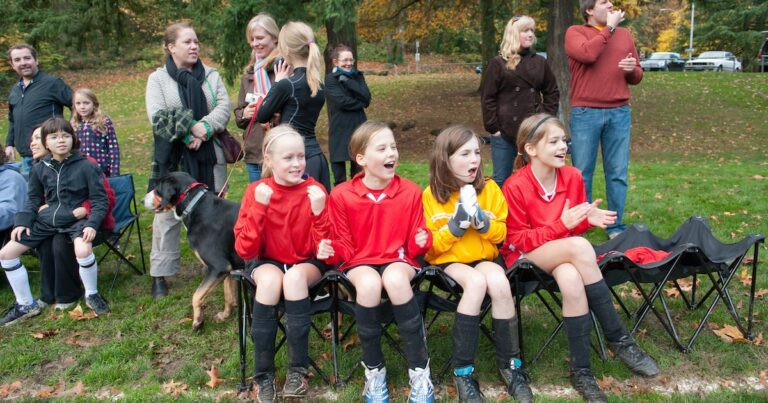
[ad_1]
I never knew how competitive I was until my kid started playing sports. Once she hit the field in her soccer gear, I was cheering and yelling from the sidelines. At one point, I got so into the game, my friend literally back away from me in embarrassment.
While my cheering from the sidelines is strictly encouragement for my child, some parents take a much darker route when it comes to being a soccer parent. And one soccer club based in Montana is trying to put an end to any sort of drama coming from the sidelines by asking parents to zip it. Completely.
Montana Surf Soccer Club, which was hosting teams from all around the state in Bozeman this past Saturday for more than 70 games, implemented what they called “Silent Saturday,” according to a release sent out by the soccer organization. The club asked parents not to talk, yell, or cheer from the sidelines during the games. The release explained that the protocol was put into place in an effort to curb parents from putting unneeded pressure on young athletes, referees, and coaches.
The rules for the games are as follows:
- No talking, yelling or “conversation” on the parent sidelines of the game
- Minimal direction from coaches on the sidelines, mainly subbing/position changes only
- Absolutely no direct conversation to the referees other than thanking them after the game
- No cheering until the game is over
Parents and fans were given the go to cheer as the game concluded.
Montana Surf Soccer Club had field marshals at every field enforcing the rules and asking the attendees of the games to keep quiet.
According to the release, one aim of this policy is for parents “to take a step back and sit quietly to watch their athletes play the beautiful game of soccer.”
For coaches, the aim is to “see what their athletes have been working on in training all week and allow them to play the game,” and the goal for players is to play without distraction, pressure or “conflicting information from parents/fans.”
The release also asked parents to reflect on the experience after the game to see whether they liked it or did not.
Martin S. Smith, president of Real Billings FC, wrote a letter designed to “clear the air” to his club’s parents, explaining that the Surf’s initiative is an effort to “allow the kids to control the game and also to remove negative sideline communications.”
“The decision to observe a ‘Silent Saturday’ is not a punishment aimed at our club, players, or parents,” Smith wrote, adding later: “Our hope is that this weekend will be a reminder that the game is all about the kids and we thank you for your support and understanding.”
Once news of the rule spread on social media, several parents posted on Facebook lambasting the idea of Silent Saturday.
One user wrote, “Absolutely miserable to play in front of silent zombies.Every player longs for the roar of a crowd during big moments, when the game pivots.”
Another joked, “Maybe they can join hands after the game and sing Kumbaya.”
“This is the most absurd thing I have ever seen! Tell me I can’t cheer on my child!” one parent wrote.
One user noted that she would actually be at those fields and gave an update on how Silent Saturday went. For context, she brought a box full of a cowbells. After the game, she commented on how the game went: “it wasn’t horrible, but definitely wasn’t fun. I personally didn’t see any field marshals to keep an eye on things, but I’m sure it was hard to find anyone to volunteer for that position.”
“I did ask my son on the way home how he felt as a player, and he didn’t like it. He did love the cow bells, but he thrives off the cheering crowd especially when they’re down a goal or two. It motivates them to get back in the game and not give up. Things were pretty quiet for the early games, but a little louder for the afternoon games. I respect everyone’s opinion, but we won’t do it again. Punish those that are the problem, not the players and those being respectful on the sidelines.”
And that’s the biggest point here — one bad apple ruins the whole bunch.
One parent’s disrespectful interaction with a referee can leave a sour taste for the rest of the season, and these kinds of instances are not that rare.
In fact, the Montana Soccer Referee Committee came out and backed the “Silent Saturday” experiment.
“Referees love hearing fans and coaches cheering their teams on, but there is NO room in youth sports for adults abusing or intimidating their players, opposing players, opposing fans, coaches, referees, field marshals, administrators, etc.,” Justin Harcrow, state youth referee administrator, wrote in support of the Surf’s initiative.
Harcrow shared that Montana has 546 U.S. Soccer certified referees, down about 50% from 10 years ago. Nationally, more than 50,000 soccer referees have quit in the last five years.
Harcrow said abuse is the number one reason for the dramatic decline.
“Clubs can see the writing on the wall that a majority of games will not have a referee if the trend continues,” he wrote. “Silent Saturdays are becoming a norm all over the country as an unfortunate necessity. Things MUST change, or there will be no game left.”
[ad_2]